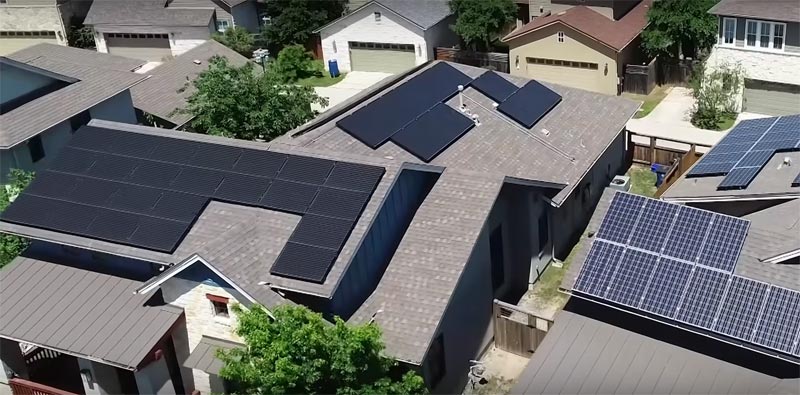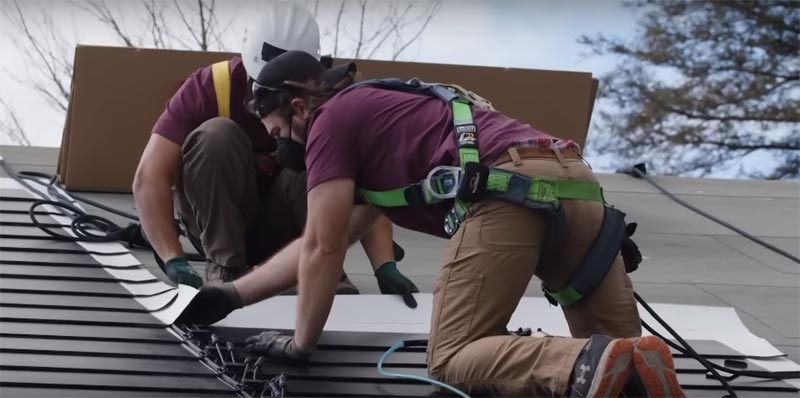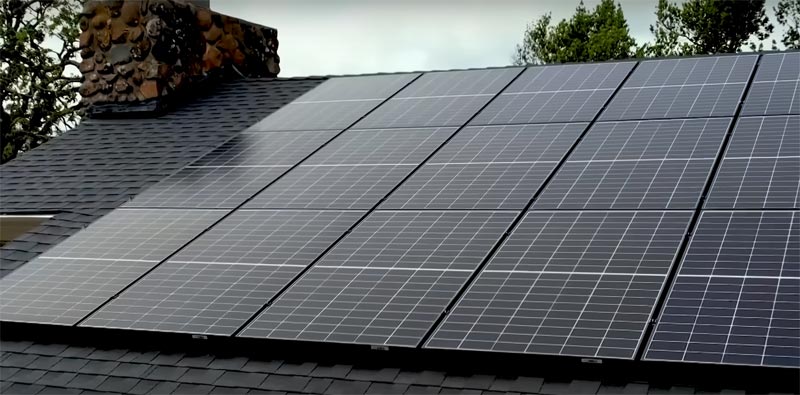Solar Panel Roof Price Guide In 2024. How Much Does Solar Panel Roof Installation Cost?
| 6kW solar panel | $18,500 |
| 3kW - 8kW | $9,255 - $28,000 |
| 6kW solar panel | $18,500 |
| 3kW - 8kW | $9,255 - $28,000 |
Average cost: $9,222 - $28,000. If you have a 6kW solar panel system with a 1,500 square foot home, the national average installation cost is $18,500. Solar panels can cost anywhere from $2.50 to $3.50 per watt, depending on the geographical location of the home. Residential solar panels are typically 3kW to 8kW in size, with total installation costs ranging between $9,255 and $28,000. See how much a solar panel system costs based on its size (before tax credits or discounts).

There are a few major but important elements that will impact how much solar panels will cost to install in your home:
Keep in mind that solar panel installation costs differ from state to state or province to province. However, new solar energy programs, according to the Department of Energy, are lowering the cost of installing solar panels year over year.
Solar costs have declined considerably in recent years, thanks to the Chinese government's influence on the global solar market by providing low-cost financing, which has increased solar panel production by more than tenfold. The Department of Energy (DOE) wants to decrease solar installation costs by half by 2030, so now is the time to invest.

| Solar Panel Size | Average Solar Installation Costs |
|---|---|
| 2 kW | $6,015 |
| 3 kW | $9,225 |
| 4 kW | $12,035 |
| 5 kW | $14,893 |
| 6 kW | $18,500 |
| 7 kW | $21,008 |
| 8 kW | $24,552 |
To get the most accurate price estimate, you'll want to add a few things to the total cost of your solar energy system. Here are a few more elements that will affect the price of your solar panels:
Local labor costs for solar installation will vary depending on your location and the average charges charged by solar installers in your area.
Installing solar mounts — The cost of installing the racks that will hold your residential solar panels will have an impact on the overall cost. There are a few solar mounting possibilities.
Installing solar inverters — To convert direct current (DC) power from the panels into alternating current (AC) power that can be used in your home, you will need to install a solar inverter.
Other expenses include any applicable local permission fees, inspection fees, and solar panel taxes federally and taxes within your state.
These "soft solar panel costs" now make up the majority of what you spend when you install solar for your home, You can thank falling solar panel prices.
Fortunately, as more people switch to solar energy, soft costs have decreased, a trend that is certain to continue. According to the National Renewable Energy Laboratory (NREL) of the federal government, installed prices have dropped by 13 to 18 percent on an annual basis.

The average residence consumes 905 kWh of power each month, or approximately 10,850 kWh per year. A 5 kW to 6 kW solar panel system could be installed in an average-sized home with adequate sunlight to help cut utility expenditures. Based on your home's location and typical sunshine exposure, you might be interested in learning about your solar sun number score. For further information, look into the various solar panel dimensions and sizes.
The lower the cost per watt, the larger the solar panel system you install for your home. The cost per watt – which includes solar panels, parts, labor, permits, and overhead – ranges from $6 to $8 per watt.
In 7 to 20 years, the money you save on your electricity bills will more than cover the expense of installing solar panels. Both the government and local energy providers provide a variety of solar rebates and incentives that can greatly accelerate your return on investment. You may also be eligible to engage in net metering in your area, which allows you to sell extra electricity generated by your solar panels.
Always consult a local solar expert to get a more accurate estimate of how much your installation will cost.
To figure out how many solar panels you'll need, figure out how much electricity you consume at home and what kind of solar panels you have.
In the United States, the average household consumes around 900 kilowatt-hours (kWh) each month or around 11,000 kWh per year. By reviewing your previous electric bills, you may readily determine your real usage. As a general principle
| Solar Panel Brand | Watts/sq ft. | Temp Coefficient | Output Decline 1yr | Output Decline 2-25yrs |
|---|---|---|---|---|
| Gaf Timberline Solar | 14.5 | -0.35% | 2% | .50% |
| Panasonic EVPV370 | 19.5 | -0.26% | 2% | .25% |
In comparison to other parts of the country, some parts of the US receive more or less sunlight. The number of solar panels you'll need is directly proportional to the amount of sunlight you get.
Remember that even if the sun is shining, if it is hidden behind a cloud, your solar PV system will not absorb the same amount of solar energy. This indicates that a solar panel in San Diego will generate more electricity in a year than a solar panel in Seattle of the same size.
You should also take into consideration that Southern states, on average, receive more sunlight than northern states. Southern states with higher altitudes and less cloud cover, such as Arizona and New Mexico, receive more solar radiation than Florida and Georgia. As a result, for the same size house in Georgia, you'd need more solar panels than in Arizona.
The graphic below will assist you in determining the amount of solar energy in your location, also known as solar insulation. It's also a good idea to look into your solar number. If your roof does not receive enough sunshine and you live on a large enough piece of property, you may have additional options available to you for placing solar panels where they will receive more sunlight.
First, Calculate your total payback to determine the return on investment for installing solar panels. You should Calculate the cost of installing a solar panel system, then multiply that by the amount you will save on monthly energy costs. These two figures demonstrate how quickly you'll be able to meet your starting expenses with your savings. Electricity rates will certainly vary by location, with the Northeast having higher rates than the Northwest. Where electricity prices are high and the sunlight is plentiful, solar tends to be more cost-effective.
Consumers in states with net metering can sell any excess solar energy they generate to their local utility. This reduces their electricity bill, reducing their payback time and increasing their cost savings.
Solar installation costs can be included in a consumer's energy bill through a variety of payment alternatives, such as solar panel leasing or a power purchase agreement (PPA). Solar leases allow homeowners to install solar panels without having to pay anything (or very little) upfront, lowering the overall cost of solar panels. The homeowner just pays a single monthly charge after the panels are installed. The fee covers both the installation and electricity supply costs, which are spread out over time.
It's worth noting that in most solar lease agreements, the solar business maintains any incentives that come with owning the panels. However, the consumer benefits in other ways. The solar provider may charge a monthly cost that is lower than the utility rate or does not increase as the utility rate increases. Homeowners have the option to renew, acquire, or have the solar panel equipment removed at the end of the contract.
Consumers profit from these types of third-party financing arrangements in a variety of ways, the best of which is the lack of a big out-of-pocket investment. The solar system is also cash-flow positive from the start. These agreements, not surprisingly, have played a significant role in the current solar energy installation boom.
In conclusion, Solar power is simple in theory, but it can be difficult to put into practice. And the best strategy for one homeowner may not be the best one for another. Take the time to acquire all of the necessary information, such as the size of the house, local solar insulation, current electric rates, and consumption. It's well worth your time to calculate your home's potential solar cost. Solar panels can not only provide electricity for your home's appliances, but they can also be used for other purposes such as heating and cooling your home, solar water heating, and even solar pool heating.